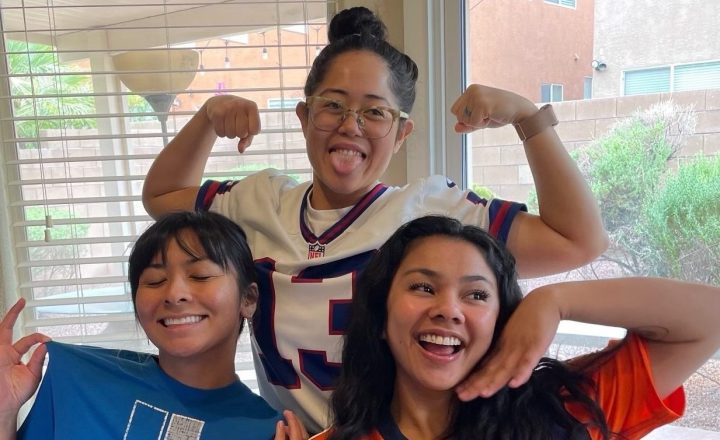
Fantasy football’s game plan: recruit more women
Share Now on:
Fantasy football’s game plan: recruit more women

It’s the tenth week of fantasy football season and more women than ever are setting their lineups and watching the waiver wire.
The number of women playing fantasy sports has increased 16% since 2019, according to the Fantasy Sports and Gaming Association. Despite that growth, the majority of fantasy sports players in the U.S. are still men, according to the FSGA.
There were over 50 million fantasy sports players in the U.S. in 2022, according to FSGA. As of 2023, 64% of all fantasy sports players were men, according to FSGA.
Fantasy sports companies see women as a good source of revenue growth. The global fantasy sports market, valued at over $28 billion, is expected to grow over the next five years thanks, in part, to more women playing, according to market forecaster Reportlinker.
“There are so many men playing that it is a much more tapped out marketplace,” explained Paul Charchian, a member of the FSGA Board of Directors and the founder of Guillotine Leagues.
So the industry is working to get more women drafting teams by normalizing women in fantasy sports content, Charchian said.
“Now virtually every significantly sized fantasy sports operation has women in clear positions of fantasy expertise,” Charchian said.
But that’s not what got Blade Cristobal to her first fantasy football draft this fall.
“I was coaxed with mimosas, and brunch. And that was enough for me to be like, ‘Yeah, I’ll be there at 10am,” Cristobal said.
She was bribed with brunch by her close friends who wanted to start a league after watching their significant others play fantasy football. Mimosas in hand, Cristobal, and seven other women who had never played any fantasy sports before, formed their league: The Football Gurlies.
“When it comes to football knowledge, we all were starting at ground zero. So, it felt fair and fun,” Cristobal said.
While she may have started with no knowledge or interest in football, today Cristobal spends her Sundays watching games with her friends and regularly checks up on her team.

“I’m finding, moments that like, I’m on the toilet, or I’m on break at work, or it’s 1am in the morning and I’m still awake. Let me just go ahead and look at what everybody’s doing and who everybody has,” Cristobal said.
And the more women get invested in fantasy sports, the more money fantasy services make. Women who played fantasy sports spent an average of $160 on fantasy services in a year, Charchaian said. That’s ten dollars less than the average male fantasy sports player spends but doesn’t include how much fantasy companies make from showing users ads.
One woman in Cristobal’s league remembers seeing ads for Dyson Airwraps and Sephora while checking her fantasy stats.
“It makes sense to target women, fantasy sports is huge business,” explained Rebecca Kissane, a professor of sociology and co-author of the book “Whose Game?: Gender and Power in Fantasy Sports.”
But there are significant barriers preventing fantasy sports from reaching gender parity, Kissane said.
Not because women aren’t interested in sports, women made up 47% of professional football fans in 2019, according to the NFL.
Instead, women interested in playing season-long fantasy struggle to find leagues with openings.
“Men have been playing with the same 12 guys for 20 years, and so it’s not like they’re opening up slots for women to join,” Kissane said.
When women do get invited to play, they’re often competing against mostly men. “That visibility means that when they make a mistake, it’s attributed to all women and their gender, rather than as individual mistakes,” Kissane said.
Women also delay playing fantasy sports because they’re worried they don’t know enough about a sport to play fantasy, even when they do, Kissane said.
“Where men don’t express that fear, they had much more confidence that if they were novices to the game, that they would pick it up,” Kissane said.
Women can join all women’s leagues and women without an invite to join an established league can start their own. But playing fantasy and starting a league takes up a lot of time, another major obstacle for women, Kissane said.
On average, women do two thirds of household labor, Kissane said. “Women just have less time for a hobby, like fantasy sports, than men do,” Kissane said.
But for Cristobal and her friends, a lack of time was part of the reason they started their fantasy league.
“We’re in our late 20s, early 30s. We have life happening and we didn’t have as much time to hang out as we did when we were younger,” Cristobal said.
Since starting the league, they carve out Sundays to watch games and spend time together. “It’s definitely brought us closer and has given us a reason to spend more time together,” Cristobal said.
Even though much of that time together is spent trash-talking each other’s teams.
There’s a lot happening in the world. Through it all, Marketplace is here for you.
You rely on Marketplace to break down the world’s events and tell you how it affects you in a fact-based, approachable way. We rely on your financial support to keep making that possible.
Your donation today powers the independent journalism that you rely on. For just $5/month, you can help sustain Marketplace so we can keep reporting on the things that matter to you.












